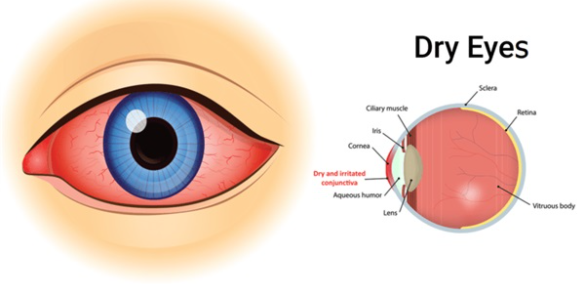
Dry eyes occur when the amount of tears are not sufficient enough to keep the necessary eye moisture. The causes of lack of tears are numerous and varied.
Feeling of dry eyes is not pleasant, and it can be associated with burning and tingling of the eyes. Dry eyes occur in many conditions, e.g. after a flight, staying in air conditioned room or staring at the television or a screen continuously for many hours.
Symptoms of dry eye:
Dry eye is a symptom, not a disease, however, it’s usually associated with one or more of the following symptoms:
- Tingling, burning or itching of the eyes.
- Mucus threads inside or around the eye.
- Eye fatigue
- Difficulty in using contact lenses.
- Tearing.
- Blurring of vision, worsens at the end of the day or after focusing at certain object for a long time.
Dry eye occurs when your eyes are not able to produce enough tears. The medical term for this condition is keratitis. Most common causes of decreased tears production are:
- Advanced age.
- Certain general medical conditions, Such as: diabetes mellitus, rheumatoid arthritis, systemic lupus erythematosus, scleroderma, thyroid disorders and vitamin A deficiency.
- Some drugs including: Anti-Histaminics, decongestants, hormonal replacements, anti-depressants, anti-hypertensives, acne, and birth control pills and Parkinsonism.
- Eye laser surgery, although symptoms of dry eye related to this surgery are temporary.
- Damage of lachrymal glands by inflammation or radiation.
Treatment of Dry eye:
The most common treatment option is using tear substitutes, and although it's a symptomatic treatment only, it's very effective in minimizing the feeling of dry eyes.
Artificial tears may be liquid, gel, or ointment. The main difference between these three types is viscosity, composition and preservative. The viscosity characterizes relative density and reflects the duration in which the substance can stay in contact with the ocular surface.
Low viscosity products are usually used in mild cases of dry eyes, and in the morning, as it may cause less blurring of vision. The more severe dry eyes, the more viscosity is needed to relieve symptoms, but it can lead to blurring of vision, so it’s better to be used shortly before bedtime.

